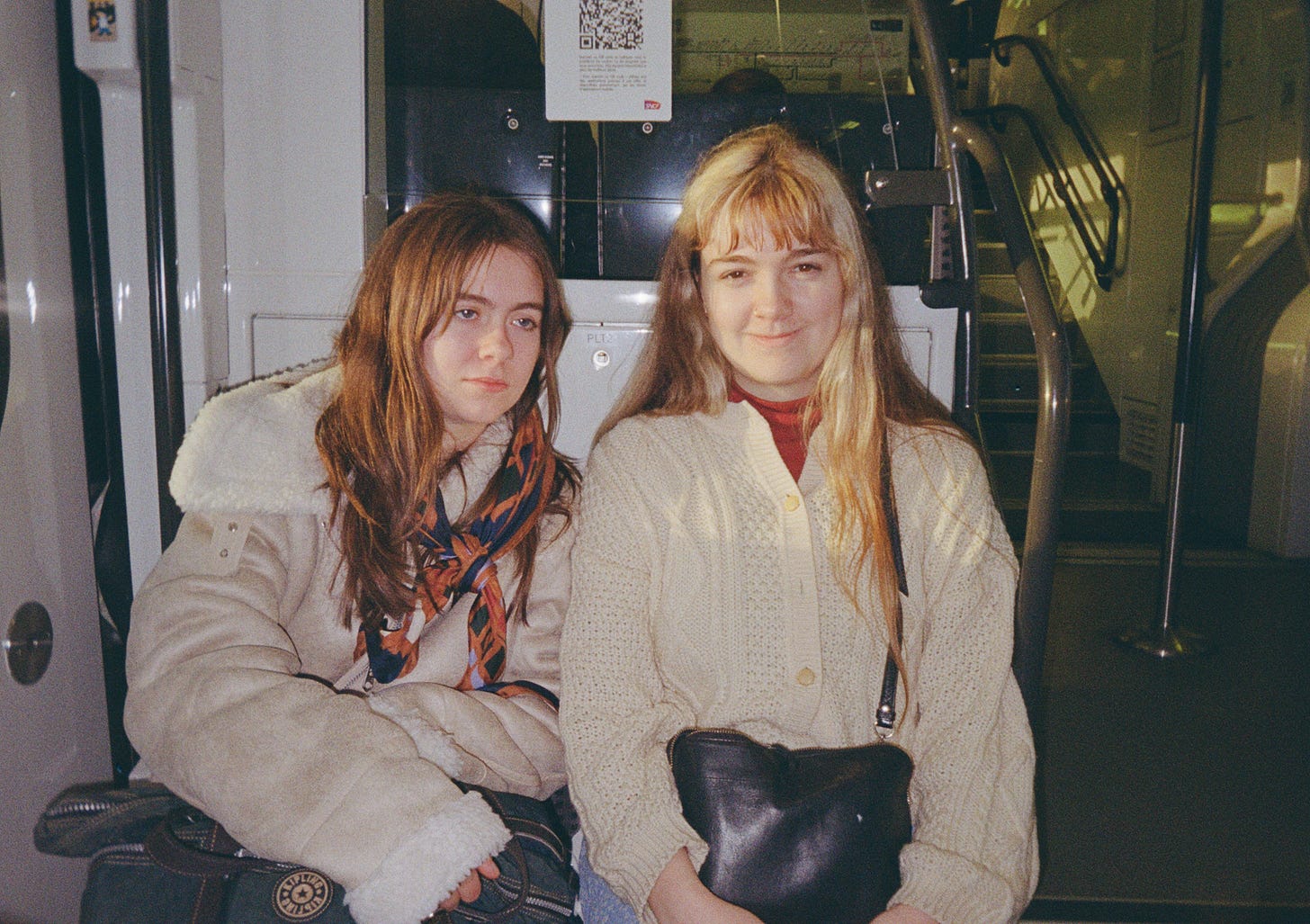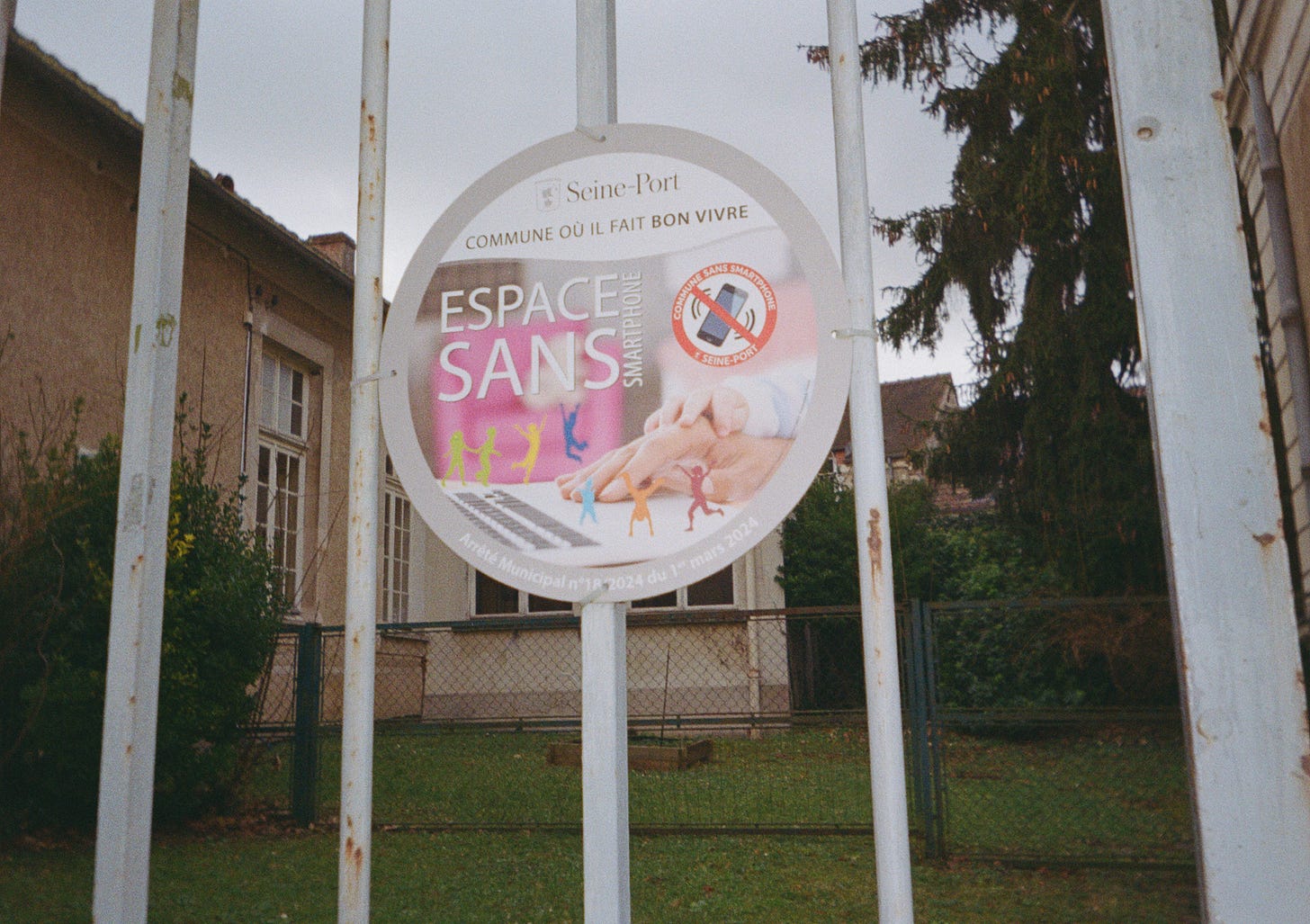Amusing Ourselves to Debt
August Lamm crosses borders and boundaries to find tech money in an analog world.
He opened the door in a company sweatshirt. I noted the ominous suffix “.ai” in the URL printed across the chest. I set my bags down and two cats scampered up to nose my ankles. There were rows of recessed white ceiling lights. The decor consisted of fantasy memorabilia and a Taylor Swift poster. “Can I have something to eat?” I asked, opening the fridge to find only condiments and creatine powder. He suggested pasta.
I sat on the fleece-blanketed couch and ate my meal, dying for salt and a dimmer switch, wondering how I might later purge my tights of tabby hair. I let the man talk. It turned out that he was still working at the tech company. “They made me CEO,” he said with either false modesty or genuinely sheepishness
“Remind me what your company does again?” I asked.
“The good kind of AI,” he said. I tried to think of what that might be. Automated vaccine distribution? Advanced cancer diagnostics? Facial recognition for sexual predators on the loose?
“Customer service emails,” he clarified.
The guest room turned out to be the living room. I cursed myself for buying my own fantasies. Would I always be at the mercy of rich men with poor taste?
He was my ex-friend’s ex-boyfriend. We’d met once, years before. He’d encouraged me, on my first night in Paris, to order a plate of duck innards. I spent the ensuing week in the bathroom.
Now he was single, and I'd been promised a spare room. Time had been kind to me and made me a business traveler, if not in class then in attitude. I was, in other words, visiting France to co-author an article with notable anti-tech activist Logan Lane.
The first thing I ever knew about Logan was how her bedroom looked. There was that unforgettable picture of her in The New York Times, black-clad and leaning against a wall of Twombly-esque scribbles. “Oh yeah,” she said absent-mindedly when I brought up the photo.
Logan was the Gen-Z ambassador of the growing neo-Luddite movement and a rare walker-of-the-walk, with no social media accounts to speak of, not even a personal website. And though she was sullen-faced in her portrait, she was high-spirited and excitable over the phone: we had spoken for five minutes before she invited me to Paris.
I met Logan at Gare de l’Est, where we bought sandwiches and boarded a regional train to a small village, Seine-Port, that had made international headlines the previous year for banning the use of smartphones in public. In the months since I’d first heard of Seine-Port, it hadn't left my mind. In a city of screen-locked eyes and bud-filled ears, I had adopted Seine-Port as my mental refuge. “There’s always Seine-Port,” I would think when someone on the bus started watching TikTok on full volume. “This would never happen in Seine-Port,” I’d think when I noticed that a hot guy was wearing an Apple watch. In Seine-Port, I imagined, the young men didn’t know the time. They gathered in jovial clusters throughout the town square, drinking little coffees and aperitifs, intermittently slapping their palms down on wet tables and shouting high-spirited Europeanisms like “Bah non!” In Seine-Port, a young woman, not necessarily myself, though similar in appearance, would cross the square, walking with exaggerated hip movements, her chin held high, tongue loaded with rebuffs. “Not today, Jean-Baptiste,” she’d call out, and the young men would shout in unison, like the cast of West Side Story, “But when?” And the young woman would carry on walking, her footsteps landing like a hundred leather-soled slaps in the face.
But there were no young people in Seine-Port. There were, however, smartphones. Logan and I spent the day interviewing locals who could not comprehend why we had come. “The smartphone ban,” we repeated, emphatically, in both French and English. “Don’t worry,” they reassured us, “you can use your smartphones wherever you like.” Logan and I returned to Paris heavy with eclairs and doom. At the train station, we went our separate ways.
I came home to an empty apartment, the tech founder having traveled to another province for a sci-fi convention. I ate a baguette in his bed while looking at my laptop. Surely there were better ways to spend a Parisian evening. I closed the laptop, glanced disinterestedly at my copy of Amusing Ourselves to Death, then opened my laptop to read blog posts. I hated the screen, hated what it did to me, hated my haters for calling me out for it, and hated myself for running home at the end of the day to open my laptop with the excitement of a person undressing before sex. Then the infernal cycle of checks: Gmail, iMessage, Whatsapp, Proton Mail, Substack, Twitter, Instagram. When there’s nothing good, I take a dip in the spam folder. When there’s nothing good, I feel terrible.
But how could I stop? I had made a career of anti-tech activism, staked my reputation on my past-tense triumph over tech-addiction, and still I lived for a new email. Could it be that there was truly no way out?
“Let’s move here,” one of us said at some point, the way every American does on a weeklong trip to Paris. Was it Logan’s idea or mine? The idea quickly became shared, its dimensions codified through manic discussion: we would move to Paris, get rid of our computers, and spend a year typewriting a book of essays about the experience. Euphoric with twin-flame neo-Luddism, we drew up checklists and timelines in our journals. Soon everything was set, decided, perfect, the only snag being the money. I made my money publishing writing online, and Logan made hers at a campus job. Obviously, she would drop out for the project. We contacted an anti-tech investor and, on a hastily-arranged Zoom call later that same night, we were astounded to hear our own pitch emerge from our mouths air-tight and fully-formed, the lines traded off in perfect repartee, as if we’d rehearsed them. “I’m sold,” the investor interrupted us to say. “You don’t have to keep convincing me.”
We went out to a bar and celebrated over glasses of sparkling water. “Everything is happening,” we said. It was like being in love, or pregnant. It was the last night of our trip, but it wasn’t really over, this wasn’t goodbye, we would be back so soon, the months would whizz by in a flurry of phone calls and broken leases and airline tickets and all the gestures of looming change that simultaneously diminish and elevate daily life, making it an exquisite prelude to the Real Thing.
Logan returned to college, and I to my brown-carpeted sublet in London. I began to share my news with the world. I sent emails to my UK agent, and my US agent, and my editors at four different news outlets. I posted on social media and racked up tens of thousands of likes. To my immense satisfaction and vindication, the world was just as enthused as I was: the editors wanted articles, the agents wanted a formal pitch, the audience wanted a front row seat to the spectacle. Only my close friends seemed skeptical. “You’re moving to Paris?” they said. “I got a grant,” I retorted. For once, someone else was orchestrating my instability.
“I’m stressing about what to do this summer and fall,” Logan emailed a few days later. As with any idea hatched with a new acquaintance in an unfamiliar environment, the logic of our plan was difficult to access in retrospect. But while I was free to extend the delusion, Logan was constrained by pre-existing obligations, in a fixed place, on a fixed timetable—she was majoring in Russian language and literature. My life, on the other hand, was unmoored; a collapsible, tent-like structure.
“You don’t have to take the semester off,” I wrote back. “You could just come for the summer.”
Logan agreed, and I relayed this update to the investor. “Logan wants to prioritize school, so she can’t commit to the Paris plan,” I wrote in an email. “But she’s totally fine with me going ahead.” I also sent him an itemized budget for the project, researched down to the cost of a Parisian subway ticket.
“I’m happy to support your project,” he wrote back, “but I would prefer we all wait until you find an accomplice.”
This sounded like a reasonable demand. I sent a list of methods for procuring an accomplice. The investor was not satisfied. He wanted more. “I think a 5 or 6 Luddite group house would be the ideal,” he wrote back.
“I’m not sure I could get a bunch of notable Luddites to drop their lives and come live with me,” I said.
Logan chimed in again with a brief but enthusiastic email about joining the house over the summer. This did nothing to soothe the investor’s mounting skepticism. “I would want all 3 of us to feel 10/10," he said. Investors tended to think in numbers. I countered this with dubious, desperate pronouncements: “I could definitely get some famous people,” I wrote. “The New Yorker would eat this up.”
His interest was reignited: “I like this all but where?” He liked it! All of it—I wasn’t sure whether this referred to my ideas or his own, but either way the future was wide open and fully-funded. I browsed real estate websites. I bragged to friends. I bought a trench coat and a book of French short stories, and mentally charged them to a business account.
But then the investor circled back: he would fund the project only on the condition that it took place in DC. With resignation, I forced myself to envision my European fantasy playing out in America’s stone-faced capital—a descent I found nearly, but not entirely, impossible to accept. There was, after all, money on the table.
But then, in the last line of the very same email, he performed a spiritual Heimlich Maneuver: “NYC would probably be best.”
I wondered why I hadn’t thought of New York to begin with. New York! The land of literature! The seat of all culture! New York was the dream. Paris had clouded my judgment. Paris was romantic, to be sure, but it wasn’t relevant. Even if I succeeded at low-tech life in Paris, the haters would only dismiss my findings as anecdotal, circumstantial, an uncontrolled experiment that could never be replicated.
And the haters were already in full force. While I’d been nailing down funding, the public tide had turned against me and my project. What at first had been lauded as a whimsical and harmless caprice was now deemed guilty of the ultimate internet offense: privilege.
“Nice, if you are privileged enough to do so!” one commenter wrote.
“I read your note and am just amazed at the level of privilege you need to reach to write it.”
“Stubborn and so privileged.”
“It is impossible to discuss this without mentioning privilege.”
I sat back as the commenters debated amongst themselves which precise privileges I possessed. “Able-bodied” was invoked a few times.
“She does seem like she might have some financial privilege she is not mentioning in her experiment,” someone wrote.
“I’m a librarian…and, well, I’m paid like a librarian, so I’ve never had the funds to do something like this so fearlessly. Be gracious to those who will make your adventure possible.” I was eager to hear how this librarian would make my adventure possible.
“You’re young, female, with substantial cash.” I liked the idea of “substantial cash.” When would it arrive? And when it did, would I be able to use it to pay off my credit card loans, or the $4,000 I owed to a German psychiatric hospital? Or would I be forced to spend it on project expenses like postage stamps?
The investor’s emails once again cooled. “Sorry for the slow response.” He professed a willingness to “hop on the phone,” but failed to suggest a suitable time. When a meeting was finally set, I revised the budget to accommodate a variety of potential directions. I now knew better than to grow attached to an idea.
The day of our call, I was attending the ARC conference at London’s neighborhood-sized ExCel Center. The Alliance for Responsible Citizenship is a right-wing organization co-founded by Jordan Peterson, and an acquaintance of mine was running the afterparty. I thought it would be rude to attend an afterparty without having attended the main event, so I sent an email to ARC requesting a press pass.
My plan was to lampoon the conference, to pen a takedown that would appear in a mid-level magazine, expertly scratching the liberal itch for moral high ground. Determined to look the part of the professional journalist—someone with an alarm clock and boundaries who wrote exclusively in the third-person—I threw together a pantsuit, the jacket of which appeared to match the slacks at a distance greater than 20 feet.
Immediately upon arrival, I made accidental eye contact with another journalist who crossed the twenty foot barrier and gave me a once-over at close range. “What exactly are you writing?” he asked.
“An article,” I said. “About the conference.”
“What’s your angle, though?”
“The New Yorker,” I said quickly. “I mean, politics.”
He looked amused by my distress. “It’s the hair,” he said, gesturing to my bleached streaks. “You look like a lib.”
I fled to the auditorium, where David Brooks was giving a talk on conservative values. The people on either side of me were looking at their phones. I watched one of them type out a text to his employee: “You got it, bro.” A woman scrolled through a list of conference attendees, only looking up to cheer when Brooks mentioned God. I was listening hard to the speech, trying to pluck out a few damning lines for my article, but Brooks was infuriatingly measured, and I reluctantly admitted to myself that I agreed with everything he said.
Even the later speeches, with their cheesy slogans—“Woke men are weak men!”—and farcical attempts at rousing the audience—“With great power comes great responsibility!”—spurred at least a few bullet points in the notebook that now no longer had journalistic pretensions. A few hours into the conference, I was whooping at an octogenarian theologian who quoted Simone Weil: “Attention is the rarest and purest form of generosity.” It occurred to me then, for the first time, that anti-tech activism was in a sense conservative. Both reflected a longing to return to an earlier, superior age. Once I’d drawn the connection, I was shocked I hadn’t seen it before.
Lunch was free, even for the libs. I consumed a feminine portion of sautéed vegetables then left for my call with the investor. The internet was weak, or perhaps overburdened by all the international visitors. I ran up and down the escalators in my fake suit, seeking a stable connection, looking like a Dickensian street urchin scrabbling after a coin on a string.
I sat down in a corner of the lobby. The atmosphere was less than ideal, highly-trafficked, loud and echoey, but maybe this would make me seem industrious, important, like the type of person who has to “carve out time” for a meeting.
I didn’t have headphones, so I held my laptop up to my head to hear what the investor was saying. The first few minutes were devoted to updates and pleasantries. The connection cut out a few times but I didn’t mention it, for fear of seeming unprofessional. When he asked me about my recent work I tried to impress him with a string of media acronyms: NBC, NPR, NYT.
“Look,” he said finally, “I just don’t think press is the way.”
“Sure,” I said, diplomatically. “But also I get emails every day from people who ditched their smartphones.”
“They’re lying,” he said. I would've collapsed but I was already on the floor.
He wanted to prioritize, he said, local community building over national media coverage projects. I might have argued that large-scale initiatives can inspire small-scale change but there was no point in arguing now. I just wanted the call to end. For the rest of it, I tried to project a sort of scrappy, imperturbable optimism—“Funding be damned, I’ll find a way!”—while waiting until I could cry in private.
But there was no privacy to be had at the ARC conference, where thousands of suited men and high-heeled women swirled about conference tables and event halls, exchanging business cards and insider knowledge and let-me-pick-your-brain’s. I remained seated on the floor for a long time after the call ended, trying to accept my new financial situation, which was in fact no different than my old financial situation, but nonetheless seemed markedly worse for the withdrawal of hope.
The lunch service ended, the dessert trays disappeared while I sat there. The feminine vegetables had not satisfied me, and my mounting hunger, unnecessary though it was—I had enough money for a sandwich—rendered my financial state bodily and therefore unignorable.
When I opened my laptop again, I found that the investor had sent an email. “Nice chatting earlier.” There was an attachment labeled “confidential.” It turned out to be a 174-page draft of his novel. “No rush,” he wrote.
The afterparty was confusing for me. I felt a moral duty not to enjoy myself, so that I might guiltlessly recount the story later on to my liberal associates. In fact, I could not help but enjoy myself. There were two dance floors, each of which appeared bumpin’ in its own special way. A life-sized zebra statue presided over us like a political metaphor. The wall mirrors multiplied our bodies, casting our every gesture as pre-ordained, eternal. The gender ratio was firmly in my favor, and my dress—a modest but flattering black sheath—withstood the appraisals it received from men whose conservative values superseded, in priority if not ferocity, their libidos. A few of these men took me aside and expressed pleasure at encountering a woman in a conservative space. “We need more of you,” they said. It felt so nice to be needed.
When the bouncers kicked everyone out after midnight, I found myself waiting for a cab with a crew of graduate students visiting from Oxford. Their patter was difficult to follow, invoking as it did a cast of thinkers absent from my Connecticut Liberal Arts College curriculum, but their impressions were funny enough to transcend context. I laughed at abstruse Hitler references all the way to the hotel, then issued a bashful apology to the driver as I exited the vehicle.
In an upper-story hotel room, my new friends drank red wine and ridiculed me, deconstructing my character, my sobriety, my ethnic background. It felt great, like a violent back rub that works out all the knots. Encouraged by their attention, I summoned the nerve to weigh in on gender politics. “I think it’s time we accept that the emancipation of women has been net-negative for society,” I said, in a statement that won me the approval I’d been seeking all night. “She’s clever,” one of them noted, as if unlocking a door. Suddenly, the Far Right was the Old West, a glittering frontier, a land rich in soil and possibility, a fresh slate, lawless and unhistoried, free for the taking. But even in the chummy, bantering fold of a wine-drunk conclave at four in the morning, I could not shake the feeling that no settlement would ever be richer, fresher, freer than perpetual motion.
At daybreak, I walked to the station. It was February and not even my conservative dress could keep me warm. My new friends were already tucked up in their hotel beds. Were they really my friends? I tried to imagine them at my birthday party, mingling with my left-wing friends. Was I just like a pet dog, devoted to the person who'd most recently patted my head? I was too indiscriminate, too impressionable to ever pick a side. So nothing had changed: I had no money and no allegiance. In other words, I had a choice. This, I knew, was a privilege.












As a member of the Oxford Far Right, it was a pleasure meeting you, August.
Highly enjoyed this.